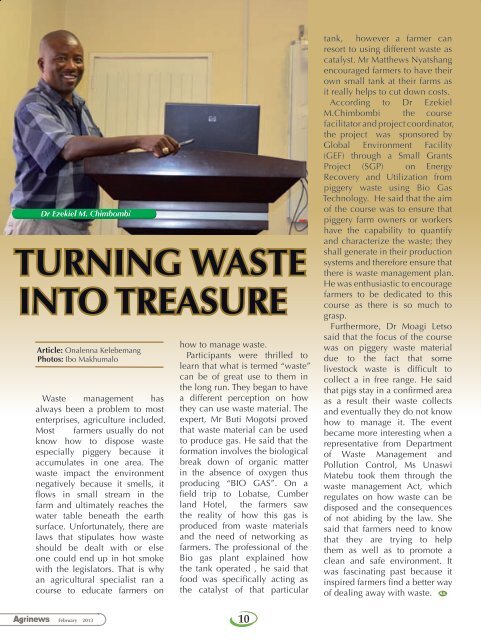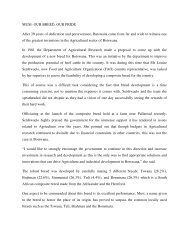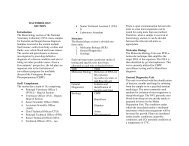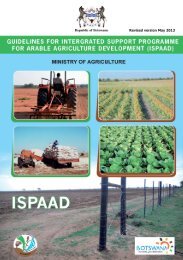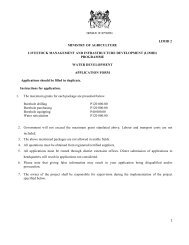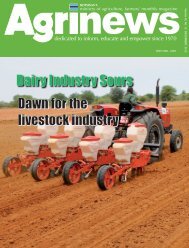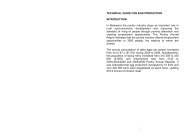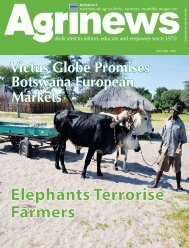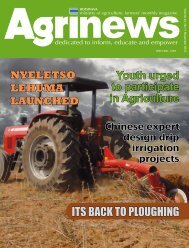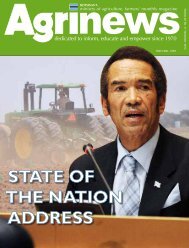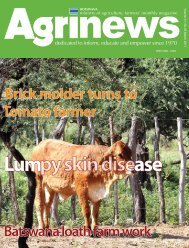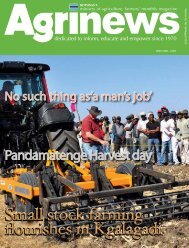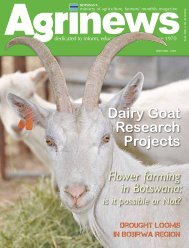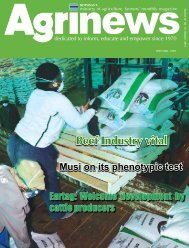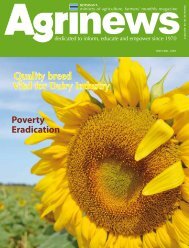Agrinews February 2013 - Ministry of Agriculture
Agrinews February 2013 - Ministry of Agriculture
Agrinews February 2013 - Ministry of Agriculture
- No tags were found...
Create successful ePaper yourself
Turn your PDF publications into a flip-book with our unique Google optimized e-Paper software.
TURNING WASTEINTO TREASUREArticle: Onalenna KelebemangPhotos: Ibo MakhumaloWaste management hasalways been a problem to mostenterprises, agriculture included.Most farmers usually do notknow how to dispose wasteespecially piggery because itaccumulates in one area. Thewaste impact the environmentnegatively because it smells, itflows in small stream in thefarm and ultimately reaches thewater table beneath the earthsurface. Unfortunately, there arelaws that stipulates how wasteshould be dealt with or elseone could end up in hot smokewith the legislators. That is whyan agricultural specialist ran acourse to educate farmers onhow to manage waste.Participants were thrilled tolearn that what is termed “waste”can be <strong>of</strong> great use to them inthe long run. They began to havea different perception on howthey can use waste material. Theexpert, Mr Buti Mogotsi provedthat waste material can be usedto produce gas. He said that theformation involves the biologicalbreak down <strong>of</strong> organic matterin the absence <strong>of</strong> oxygen thusproducing “BIO GAS”. On afield trip to Lobatse, Cumberland Hotel, the farmers sawthe reality <strong>of</strong> how this gas isproduced from waste materialsand the need <strong>of</strong> networking asfarmers. The pr<strong>of</strong>essional <strong>of</strong> theBio gas plant explained howthe tank operated , he said thatfood was specifically acting asthe catalyst <strong>of</strong> that particulartank, however a farmer canresort to using different waste ascatalyst. Mr Matthews Nyatshangencouraged farmers to have theirown small tank at their farms asit really helps to cut down costs.According to Dr EzekielM.Chimbombi the coursefacilitator and project coordinator,the project was sponsored byGlobal Environment Facility(GEF) through a Small GrantsProject (SGP) on EnergyRecovery and Utilization frompiggery waste using Bio GasTechnology. He said that the aim<strong>of</strong> the course was to ensure thatpiggery farm owners or workershave the capability to quantifyand characterize the waste; theyshall generate in their productionsystems and therefore ensure thatthere is waste management plan.He was enthusiastic to encouragefarmers to be dedicated to thiscourse as there is so much tograsp.Furthermore, Dr Moagi Letsosaid that the focus <strong>of</strong> the coursewas on piggery waste materialdue to the fact that somelivestock waste is difficult tocollect a in free range. He saidthat pigs stay in a confirmed areaas a result their waste collectsand eventually they do not knowhow to manage it. The eventbecame more interesting when arepresentative from Department<strong>of</strong> Waste Management andPollution Control, Ms UnaswiMatebu took them through thewaste management Act, whichregulates on how waste can bedisposed and the consequences<strong>of</strong> not abiding by the law. Shesaid that farmers need to knowthat they are trying to helpthem as well as to promote aclean and safe environment. Itwas fascinating past because itinspired farmers find a better way<strong>of</strong> dealing away with waste.<strong>February</strong> <strong>2013</strong> 10


